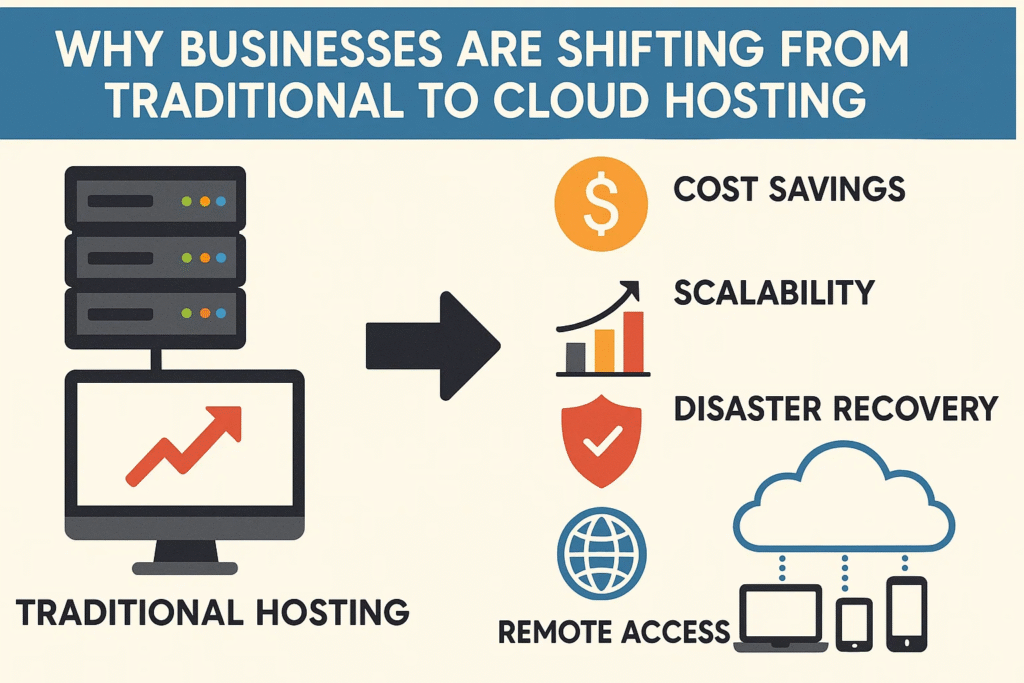The digital transformation wave has redefined how businesses operate, communicate, and serve customers. From startups to large enterprises, one of the most significant changes in recent years has been the migration from traditional hosting to cloud hosting.
Traditional hosting — where businesses rent or buy physical servers — has long been the foundation of online operations. However, as the need for speed, scalability, and security grows, organizations are turning toward cloud-based solutions.
Table of Contents
| Section | Description |
|---|---|
| 1. Introduction | Overview of the topic |
| 2. What is Traditional Hosting? | Understanding how traditional hosting works |
| 3. What is Cloud Hosting? | Explaining cloud infrastructure and services |
| 4. Traditional Hosting vs Cloud Hosting | Key differences explained |
| 5. Why Businesses Are Switching to Cloud Hosting | Core reasons for the transition |
| 6. Major Benefits of Cloud Hosting | The tangible and intangible advantages |
| 7. Cloud Hosting in Small vs Large Businesses | How the benefits differ |
| 8. Challenges in Cloud Migration | Common obstacles faced during transition |
| 9. Future of Cloud Hosting | Trends and predictions |
| 10. Conclusion | Final thoughts and summary |
1. What is Traditional Hosting?
Before cloud computing took the spotlight, traditional hosting was the backbone of the internet. It refers to hosting services where a business’s website or application is stored on a physical server.
There are mainly two types of traditional hosting:
-
Shared Hosting – Multiple websites are hosted on a single server, sharing resources like CPU, RAM, and storage. It’s affordable but limited in performance.
-
Dedicated Hosting – The business rents or owns an entire server. It offers high performance and control but comes at a higher cost.
Characteristics of Traditional Hosting
-
Fixed resources and capacity
-
Hardware maintenance required
-
Limited scalability
-
Higher setup costs
-
On-site physical infrastructure
Traditional hosting served businesses well for years, but as online operations expanded, it began showing limitations — especially in handling traffic spikes, scaling efficiently, and ensuring high availability.
2. What is Cloud Hosting?
Cloud hosting revolutionized how businesses store, manage, and deliver data. Instead of relying on a single physical server, cloud hosting uses a network of interconnected virtual servers located across multiple data centers.
In simple terms, your website or app runs “in the cloud” — powered by distributed computing resources.
Key Features of Cloud Hosting
-
Scalability on demand
-
High availability and uptime
-
Pay-as-you-go pricing model
-
Automated updates and backups
-
Global accessibility
Major providers like AWS, Google Cloud, Microsoft Azure, and DigitalOcean offer flexible solutions that cater to businesses of all sizes.
3. Traditional Hosting vs Cloud Hosting (Comparison Table)
| Feature | Traditional Hosting | Cloud Hosting |
|---|---|---|
| Infrastructure | Single physical server | Multiple virtual servers |
| Scalability | Limited and manual | Instant and automatic |
| Cost Model | Fixed monthly/annual cost | Pay-as-you-go (usage-based) |
| Performance | Depends on hardware | Dynamic and optimized |
| Security | Dependent on in-house measures | Multi-layered cloud protection |
| Downtime | High risk due to single server failure | Minimal with redundancy |
| Maintenance | Manual server management | Managed by provider |
| Backup | Manual or scheduled | Automated and distributed |
| Accessibility | Limited to specific location | Global access via internet |
| Environment Impact | High energy consumption | More energy-efficient |
The above comparison clearly shows that cloud hosting offers superior flexibility, cost-efficiency, and resilience — all of which are essential for modern businesses.
4. Why Businesses Are Switching to Cloud Hosting
The shift from traditional to cloud hosting isn’t just a trend; it’s a strategic transformation driven by technology and business needs.
Here are the primary reasons behind this migration:
1. Scalability
Businesses experience fluctuations in website traffic, especially during campaigns or peak seasons. Cloud hosting allows instant scaling — increasing or decreasing resources like CPU, RAM, and storage as needed.
2. Cost Efficiency
With traditional hosting, you pay for fixed server resources, whether you use them or not. Cloud hosting introduces a pay-per-use model, ensuring businesses only pay for what they consume.
3. Improved Performance
Cloud servers use load balancing and distributed networks to deliver faster speeds, lower latency, and enhanced user experience worldwide.
4. Data Security
Leading cloud providers invest heavily in cybersecurity, offering encryption, multi-layer firewalls, and compliance with global data protection regulations.
5. Accessibility and Mobility
Employees can access systems and data from anywhere with an internet connection — a crucial feature for remote work and global collaboration.
6. Reliability
Since cloud hosting distributes data across multiple servers, downtime is rare. Even if one server fails, another automatically takes over.
7. Eco-Friendliness
Cloud providers optimize energy usage and invest in green data centers, making cloud hosting more environmentally sustainable.
5. Major Benefits of Cloud Hosting
Let’s dive deeper into the benefits that make cloud hosting the smarter choice.
1. Flexibility and Agility
Businesses today need to respond quickly to market changes. Cloud hosting enables easy adjustments to workloads, configurations, and storage without any downtime.
2. Business Continuity
With automatic backups, disaster recovery, and redundancy, cloud hosting ensures business continuity even during unexpected failures or cyberattacks.
3. Better Collaboration
Teams can work simultaneously from different parts of the world using the same platform and resources, fostering innovation and speed.
4. Enhanced Customer Experience
Fast-loading websites and applications result in higher user satisfaction, better SEO rankings, and ultimately improved conversion rates.
5. Innovation-Friendly
Cloud platforms support cutting-edge technologies such as AI, machine learning, and big data analytics, allowing companies to innovate faster.
6. Lower IT Overheads
There’s no need to maintain physical infrastructure or hire large IT teams for maintenance. Cloud providers handle everything from updates to hardware management.
6. Cloud Hosting in Small vs Large Businesses
| Business Type | Challenges | How Cloud Hosting Helps |
|---|---|---|
| Startups & Small Businesses | Limited budget, lack of IT expertise | Affordable pay-as-you-go plans, easy management, scalability |
| Medium Enterprises | Expanding infrastructure needs | Flexible cloud solutions, hybrid hosting, centralized management |
| Large Enterprises | Complex operations, high traffic, global presence | Advanced scalability, enterprise-grade security, global availability |
Whether it’s a small local startup or a multinational enterprise, cloud hosting provides customizable options for every business scenario.
7. Challenges in Cloud Migration
While the benefits are clear, transitioning from traditional hosting to the cloud can bring certain challenges.
1. Data Migration
Transferring large volumes of data securely and efficiently can be complex. Businesses need strategic planning and skilled professionals to avoid downtime.
2. Cost Estimation
Pay-as-you-go models can sometimes lead to higher costs if not monitored carefully. Proper usage tracking is essential.
3. Vendor Lock-In
Once a company chooses a provider, switching to another cloud service can be difficult due to dependency on proprietary tools and configurations.
4. Security Concerns
Although cloud platforms are highly secure, businesses must still ensure data privacy, access control, and compliance with regulations.
5. Skill Gap
Cloud technology requires knowledge of configuration, automation, and security — areas where traditional IT teams might need training.
8. The Future of Cloud Hosting
The future of cloud hosting looks brighter than ever. According to global reports, over 90% of organizations are expected to adopt a cloud-first strategy within the next decade.
Here are some emerging trends shaping the cloud landscape:
1. Multi-Cloud Strategy
Companies are combining multiple cloud providers to balance cost, security, and performance.
2. Edge Computing
Data processing is moving closer to end-users, reducing latency and improving real-time analytics.
3. AI-Powered Cloud Services
Artificial intelligence is being integrated into cloud management systems to optimize resource allocation and detect threats automatically.
4. Sustainable Cloud Infrastructure
Green data centers using renewable energy will continue to dominate future hosting innovations.
5. Serverless Architecture
Developers can deploy applications without managing servers, reducing complexity and speeding up development.
Cloud hosting is no longer just an option — it’s becoming the foundation of digital transformation worldwide.
9. Real-World Examples of Cloud Adoption
| Company | Traditional Hosting Challenges | Cloud Hosting Solutions | Outcome |
|---|---|---|---|
| Netflix | Scalability issues during peak times | Migrated to AWS Cloud | Seamless streaming worldwide |
| Airbnb | Managing high traffic globally | Adopted cloud-based infrastructure | Improved speed and availability |
| Coca-Cola | Managing regional data centers | Shifted to hybrid cloud | Centralized operations and analytics |
| Spotify | Performance bottlenecks | Leveraged Google Cloud | Enhanced personalization using AI |
These success stories highlight how the move to cloud hosting transforms business performance at every level.
10. Conclusion
The shift from traditional hosting to cloud hosting marks a new era in business technology. What once required bulky servers and large IT teams can now be managed through scalable, secure, and intelligent cloud solutions.
Businesses today value agility, flexibility, and global reach — all of which the cloud delivers seamlessly. While challenges like migration and vendor lock-in exist, the long-term benefits far outweigh the temporary hurdles.
Whether you’re a startup looking for cost-efficient hosting or a large enterprise seeking reliable scalability, cloud hosting is the future.
It’s not just about hosting — it’s about creating a smarter, faster, and more resilient digital ecosystem.


